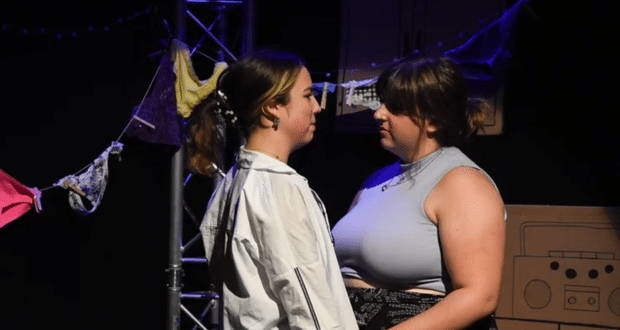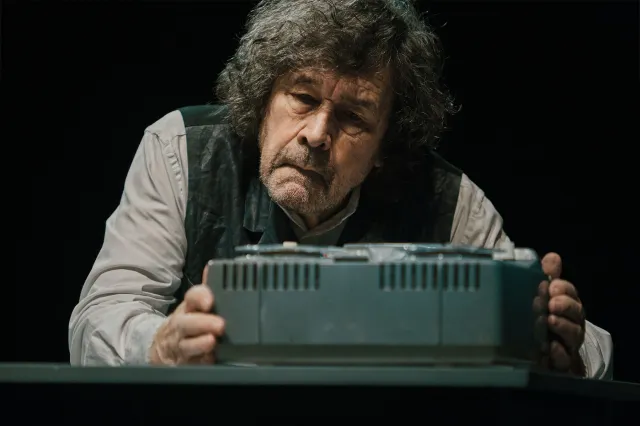Bread & Roses Theatre
Like a shared advert for Spareroom and Tinder over Pride: intense chats over coffee and evenings in with a bottle of wine blur the confusing rules of sexuality, friendship, and flat sharing for two twenty-somethings.
Now, I have lived with some deliciously odd humans: I think we all have, after years trapped in this renter’s hell that is the UK. Sludgy stoners, people so tyrannical they made Mussolini look chilled out, snake owners. But what happens when the perfect storm strikes, where two drifting and lonely women collide?
Enter Kitchen Underwear, a heartwarming – if a little literal – tail of queer love. Let me introduce you to Ash: a bubbling, 1000-word-a-minute poet played with fizzing activity by Kate Stamoulis. Zee: her landlord/roommate, is a heartbroken, melancholic translator (a rather rigid Maria Goikhberg). You know – the classic introvert meets extrovert and both flourish.
Together their joint eccentricities (hanging artwork created entirely with pants, tarot card readings, and early morning conversations about love) create a shared life that bleeds into more than just cohabitation.
Writing and starring in the show, Stamoulis and Goikhberg have a believable charm. Attired in Lucy and Yak (the lesbian uniform) mentioning U-Haul-ing (moving quickly into a relationship), poetry reading, café culture, pickling, and a rolodex of emotional but short-lived affairs nail the queer world to the wall with loving swings.
However, at points, the piece is a little like a tea made by someone you don’t know very well. Not wrong, just not entirely right. The blurb tells us that they live in Edinburgh but they hardly ever mention the stunning Scottish capital. Both sporting American accents, it could be any large city where queers conglomerate across the English-speaking world. The spartan nature of the set and props is by no means an impediment to a successful show, and in fact, helps us to focus in on the awkwardness of the couple’s initial courting. However, an overreliance on ‘dear diary’ set up (with alternating pink and blue lights for each) binds the story to static ‘and then I did this’ repetitive, past tense, and distancing narrative structure; like the story is always looking over its shoulder, somehow finished before it starts.
Becca Donley’s directing builds the soft intimacy between the performers, and at points this reaches chinchilla level of cuteness. Although the tale is far from revolutionary, or culturally specific, since when did that stop the rom-com industry from doing very well?
Queer love stories with neither blissfully happy nor devastatingly sad endings are rare, and for a realistic and truthful view of people who date the same sex, Kitchen Underwear is an enjoyable edition.



